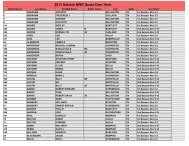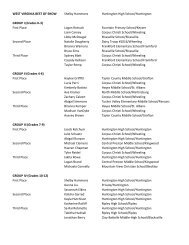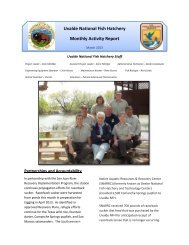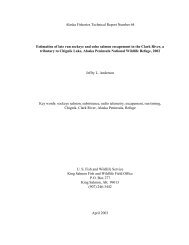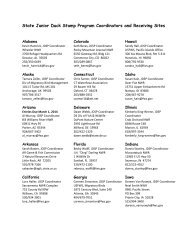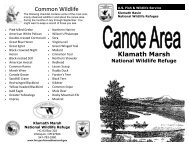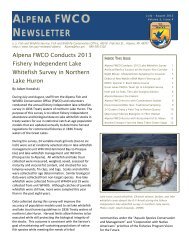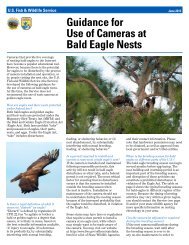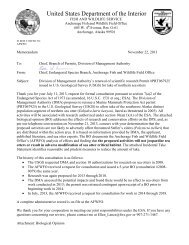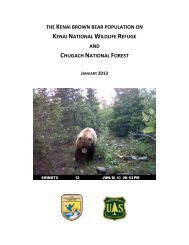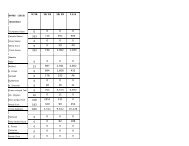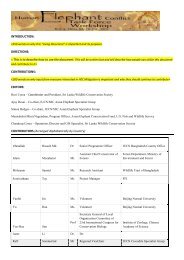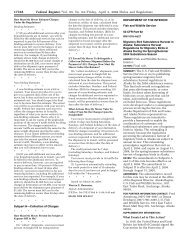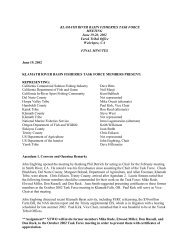Assabet River NWR Final CCP - U.S. Fish and Wildlife Service
Assabet River NWR Final CCP - U.S. Fish and Wildlife Service
Assabet River NWR Final CCP - U.S. Fish and Wildlife Service
Create successful ePaper yourself
Turn your PDF publications into a flip-book with our unique Google optimized e-Paper software.
Appendix F: Staffing Charts<br />
Special use permits will be issued to organizations conducting environmental education or<br />
interpretive tours or activities. A fee may be charged for the special use permit. The areas<br />
used by such tours will be closely monitored to evaluate the impacts on the resource; if<br />
adverse impacts appear, the activity will be moved to secondary locations or curtailed or<br />
discontinued. Specific conditions may apply depending upon the requested activity <strong>and</strong> will<br />
be addressed through the special use permit.<br />
Guidelines to ensure the safety of all participants will be issued in writing to the teacher or<br />
group leader responsible for the activities <strong>and</strong> will be reviewed before the activity begins.<br />
Justification: The National <strong>Wildlife</strong> Refuge System Improvement Act of 1997 (P.L. 105-<br />
57) identifies six legitimate <strong>and</strong> appropriate uses of wildlife refuges: environmental<br />
education, interpretation, hunting, fishing, wildlife observation <strong>and</strong> wildlife photography.<br />
These priority public uses are dependent upon healthy wildlife populations. Where these<br />
uses are determined to be compatible, they are to receive enhanced consideration over<br />
other uses in planning <strong>and</strong> management.<br />
Environmental education <strong>and</strong> interpretation activities generally support Refuge purposes<br />
<strong>and</strong> impacts can largely be minimized (Goff et al., 1988). The minor resource impacts<br />
attributed to these activities are generally outweighed by the benefits gained by educating<br />
present <strong>and</strong> future generations about refuge resources. Environmental education is a<br />
public use management tool used to develop a wildlife conservation ethic within society.<br />
While it targets school age children, it is not limited to this group. This tool allows us to<br />
educate refuge visitors about endangered <strong>and</strong> threatened species management, wildlife<br />
management <strong>and</strong> ecological principles <strong>and</strong> communities. A secondary benefit of<br />
environmental education is that it instills an ‘ownership’ or ‘stewardship’ ethic in visitors<br />
<strong>and</strong> most likely reduces v<strong>and</strong>alism, littering <strong>and</strong> poaching; it also strengthens <strong>Service</strong><br />
visibility in the local community. Environmental education (outdoor classroom) is listed in<br />
the Refuge Manual (U.S. <strong>Fish</strong> <strong>and</strong> <strong>Wildlife</strong> <strong>Service</strong>, 1985) as the highest priority visitor use<br />
activity throughout the National <strong>Wildlife</strong> Refuge System.<br />
These activities will not materially interfere with or detract from the mission of the<br />
National <strong>Wildlife</strong> Refuge System or the purposes for which the refuge was established.<br />
Signature - Refuge Manager: /s/ Elizabeth A. Herl<strong>and</strong> 12/21/2004<br />
(Signature <strong>and</strong> Date)<br />
Concurrence - Regional Chief: /s/ Anthony D. Léger 12/27/2004<br />
(Signature <strong>and</strong> Date)<br />
M<strong>and</strong>atory 15-year Reevaluation Date: December 27, 2019<br />
- 214 -<br />
<strong>Assabet</strong> <strong>River</strong> <strong>NWR</strong>



